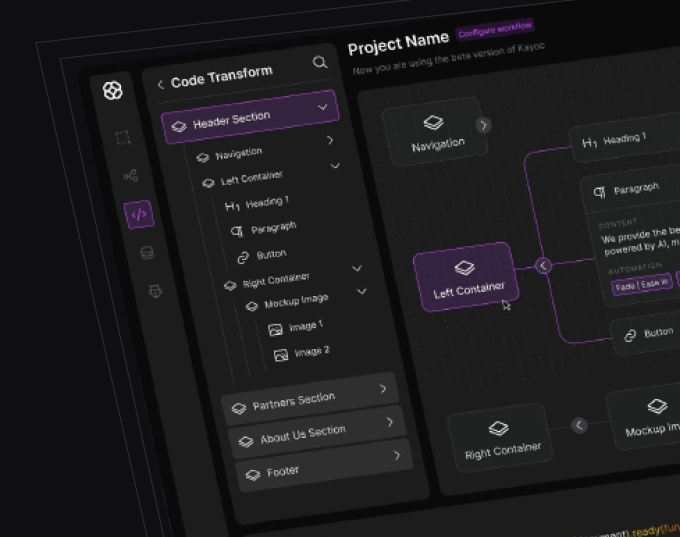Implement RPA To Boost Business Performance
Streamline operations and boost business growth. Adapt to growing business demands with additional labor costs.
Our RPA services help you identify automation opportunities with which you can scale your operations like never before. With our solutions, you can reduce employee workload by eliminating manual tasks and focusing more on analytical, strategic, and creative work





















RPA development experts from A3Logics provide end-to-end automation services, easing the integration of time- and money-saving bots into existing IT infrastructures. Choose our RPA development company if you want to improve the efficiency of your operational processes, raise your productivity levels, and stimulate the expansion of your company.
Streamline operations and boost business growth. Adapt to growing business demands with additional labor costs.
 Process Discovery and Analysis
Process Discovery and Analysis Intelligent Process Automation Services
Intelligent Process Automation Services Workflow Automation Services
Workflow Automation Services RPA Governance & Compliance Management
RPA Governance & Compliance Management RPA Center of Excellence (CoE) Development
RPA Center of Excellence (CoE) Development Analytics and Reporting Services
Analytics and Reporting Services RPA Training and Documentation
RPA Training and Documentation RPA Implementation Services
RPA Implementation ServicesWe conduct comprehensive assessments to uncover high-value robotic process automation opportunities tailored to your unique operations. By evaluating workflows, resource allocations, and performance metrics, OUr RPA experts identify processes ripe for automation while minimizing disruptions to business continuity.
With our intelligent process automation services, we use the power of cloud, data, and AI to improve speed, quality, and customer experience. We can make your business process systems more resilient, predictive, and adaptable.
We develop bespoke automation solutions tailored to address the unique challenges of your business. From streamlining repetitive processes to enhancing cross-functional workflows, our custom-made solutions deliver unparalleled operational efficiency, fostering innovation and scalability.
We establish robust governance frameworks that safeguard compliance with industry standards and regulations. Our policies and control measures help businesses mitigate risks, maintain audit readiness, and ensure the secure functioning of automated systems across various operational layers.
We help you establish an RPA center of excellence to govern, support, and scale your RPA initiatives. From defining best practices to training teams, we ensure the success and sustainability of your RPA efforts.
We provide RPA Analytics and Reporting services with real-time insights into bot performance, using dashboards and metrics to help you make data-driven decisions, optimize processes, and enhance efficiency across your automation initiatives.
Our RPA training and documentation services empower your teams with custom-tailored training programs to demystify RPA tools and techniques. We provide detailed user guides, operational documentation, and immersive workshops that equip employees to manage, troubleshoot, and optimize automated workflows confidently and efficiently.
We design, deploy, and integrate automated workflows to streamline repetitive business tasks. Our RPA implementation services help define the future state of your business processes. Our RPA experts enable intelligent automation throughout your organization by implementing processes and tools and integrating platforms.
Our RPA consulting and advisory services help businesses identify opportunities, create a roadmap, and implement an RPA strategy aligned with their goals. We also provide a comprehensive process assessment and recommend the best RPA tools for our clients’ needs.
Our Proof of Concept development service allows you to test RPA on a smaller scale. Before full implementation, ensure they meet your business requirements. We help validate feasibility, address challenges, and confirm expected benefits.
Our RPA Testing and Quality Assurance services ensure your bots run efficiently and securely. We validate functionality, address issues, and ensure smooth performance before deployment to minimize risks and optimize automation.
We develop software that integrates seamlessly with existing systems while providing enhanced functionalities such as automated workflows, advanced analytics, and user-friendly interfaces. This customization ensures that banks can optimize their operations and deliver superior customer service.
We offer ongoing RPA Support and Maintenance to ensure your solutions continue to perform optimally. Our team monitors and updates your bots, ensuring long-term success and continuous improvement in your automation processes.
Our RPA integration services seamlessly integrate robotic process automation into your enterprise ecosystems, including ERP, CRM, and other platforms. Ensuring interoperability across systems enables organizations to scale automation effortlessly, fostering unified workflows and data synchronization.
Reduce manual work and accelerate business processes. Improve accuracy for seamless operations.
At A3Logics, our RPA consultants utilize their extensive technical knowledge and industry expertise to provide comprehensive guidance throughout your robotic transformation journey.






Take The First Step Towards AI-enabled enterprise
Heimler’s Journey From Blind Spots to Business Clarity – A3logics Unleashes the Power of Live Intelligence
Discover More
Redefining the Future of Lending – Cred Fintech’s Monumental Transformation with A3logics
Discover More
Revolutionizing Credit Risk – How A3logics and Heimler Redefined Trust and Precision with Machine Learning
Discover More
Transforming Risk to Opportunity – A3logics and Heimler Revolutionize Credit Risk Modelling
Discover More
Streamline operations and boost business growth. Adapt to growing business demands with additional labor costs.
Robotic process automation has slowly but surely made a drastic change in businesses’ workflows. Simplifying customer service and streamlining processes, RPA services offer many use cases for various industries.
Leverage RPA in human resources to automate repetitive HR tasks like employee onboarding, payroll processing, and attendance tracking. Streamline benefits management, resume screening, and compliance reporting, freeing HR teams to focus on strategic initiatives, improving employee experience, and enhancing overall productivity.
Ensure real-time compliance with evolving regulations by automating data collection, validation, and reporting. Implementing robotic process automation minimizes manual errors, ensures audit readiness, and reduces non-compliance risk by streamlining workflows in regulatory-intensive sectors like banking, healthcare, and insurance.
Enhance supply chain efficiency by automating inventory tracking, demand forecasting, and order processing by leveraging our RPA services. RPA optimizes vendor management, shipping coordination, and invoice reconciliation, reducing delays, improving accuracy, and fostering seamless supply chain operations across industries.
Accelerate document management with automated data extraction, classification, and validation. RPA simplifies workflows by efficiently processing invoices, contracts, and customer forms, reducing manual effort, improving data accuracy, and ensuring quick turnaround times for high-volume document processing.
Deploy RPA bots to analyze transaction patterns, flag anomalies, and cross-check data against fraud indicators. Automate fraud reporting, real-time alerts, and compliance checks, enabling businesses to safeguard assets and strengthen security frameworks effectively.
Streamline the insurance claim lifecycle by automating document collection, data validation, and claim adjudication. Implementing RPA reduces your agency’s processing times, enhances accuracy, and ensures faster claim settlements, improving customer satisfaction and operational efficiency in insurance services.
Implement RPA to boost lead generation and customer engagement by automating email campaigns, data analysis, and CRM updates. RPA simplifies lead scoring, competitor analysis, and campaign reporting, enabling sales and marketing teams to focus on strategy and driving revenue growth.
Automate customer onboarding, query resolution, and personalized engagement strategies with RPA. Enhance CRM systems by automating data entry, updating records, and generating insights, ensuring seamless customer interactions and loyalty.
Automate repetitive tasks performed via graphical user interfaces (GUIs), such as form filling, application navigation, and screen scraping. RPA bots mimic human actions, ensuring consistency and speed in legacy system operations without the need for complex coding changes.
Simplify invoice processing, vendor payments, and reconciliation tasks with RPA. Bots extract and validate data, match invoices with purchase orders, and generate payment approvals, reducing errors, ensuring timely payments, and improving cash flow management.
Enhance financial operations by automating tasks like journal entries, tax compliance, and account reconciliation. RPA ensures data accuracy, generates real-time reports, and accelerates month-end closings, empowering financial teams with insights and efficiency.
Enhance productivity, reduce workload, and minimize errors. RPA simplifies operations by automating them.
Attended RPA helps individual users with repetitive activities. It works well for smaller, more discrete actions that are triggered by users or particular situations. As the robot is installed on a user’s computer or virtual machine, it can be activated as necessary to perform duties in the background while the user is still working.
Unattended RPA does lengthy procedures on its own without requiring human intervention. For complicated, repetitive activities carried out in batches on a virtual machine, it is perfect. Human involvement is not necessary for this kind of automation to initiate procedures.
Hybrid RPA integrates attended and unattended robots. The attended robot helps users and triggers the unattended robot for back-end processing. This approach fits businesses with strong security policies keeping data only on users’ computers. It works for procedures needing engagement but with back-end processing.
Successful automation depends on choosing the appropriate RPA platform. Many systems provide special qualities and features to fit various corporate needs. Knowledge of these systems guarantees efficient deployment and best performance of RPA solutions.
A prominent RPA tool, UiPath is used to automate regular company operations across sectors. It includes tools for bot development, optimization, maintenance, and built-in performance analysis. Expertise covers smart document processing, generative text extraction, and predictive text completion using UiPath’s artificial intelligence features.
For businesses inside a Microsoft business applications environment, part of the Microsoft Power Apps suite, Power Automate is best. It uses task and process mining features of the platform to find automation possibilities and specify RPA bot process optimization strategies.
Blue Prism provides a strong framework for automating intricate, end-to-end corporate procedures. It offers a safe and scalable platform for deploying RPA solutions throughout the company. Expertise include planning and executing automation projects, building and deploying digital workers, and running and tracking RPA rollouts.
Unlock the infinite prowess of RPA. Scale your operations and take automation to new heights.

A3Logics leverages the latest advancements in RPA, integrating AI, machine learning, and intelligent automation to deliver transformative solutions. From automating mundane tasks to optimizing end-to-end workflows, we help businesses scale operations and maintain a competitive edge.
Our RPA services are designed with a user-first approach, delivering intuitive, efficient, and seamless workflows. By automating repetitive tasks, we enable businesses to enhance employee productivity, reduce errors, and focus on strategic initiatives.
A3Logics ensures that all RPA solutions are built with robust security features and comply with global standards such as GDPR, HIPAA, and ISO 27001. Our services safeguard sensitive data, minimize risks, and meet regulatory requirements effortlessly.
Explore the potential of RPA with our flexible try-and-buy model. Evaluate the performance, scalability, and business alignment of our robotic process automation services before committing fully, ensuring your investment drives measurable results.
Our RPA services integrate seamlessly with your existing systems, including CRMs, ERPs, and custom software. We ensure a unified, automated ecosystem that drives efficiency, streamlines operations, and enhances decision-making capabilities.
A3Logics provides end-to-end support and maintenance for RPA, ensuring they remain optimized, secure, and up-to-date. From proactive upgrades to quick issue resolution, we ensure your automation systems operate reliably and efficiently.
A3logics has developed an administrative management system for a health testing company. The product is designed to handle operations such as consultant matching, time reporting, and compensation management.

“The collaborative team we’ve worked with has shown great flexibility and excellent project integration.”
A3Logics has developed an administrative management system for a health testing company. The product is designed to handle operations such as consultant matching, time reporting, and compensation management.

“The collaborative team we’ve worked with has shown great flexibility and excellent project integration.”
A3Logics has developed an administrative management system for a health testing company. The product is designed to handle operations such as consultant matching, time reporting, and compensation management.

“The collaborative team we’ve worked with has shown great flexibility and excellent project integration.”
A3logics has developed an administrative management system for a health testing company. The product is designed to handle operations such as consultant matching, time reporting, and compensation management.

“The collaborative team we’ve worked with has shown great flexibility and excellent project integration.”
A3Logics has developed an administrative management system for a health testing company. The product is designed to handle operations such as consultant matching, time reporting, and compensation management.

“The collaborative team we’ve worked with has shown great flexibility and excellent project integration.”
RPA is known to reduce costs, enhance efficiency and boost productivity in business processes. This approach helps businesses automate repetitive processes, allowing employees to focus more on strategic tasks. RPA can also reduce errors and improve accuracy in data processing.


Marketing Head & Engagement Manager